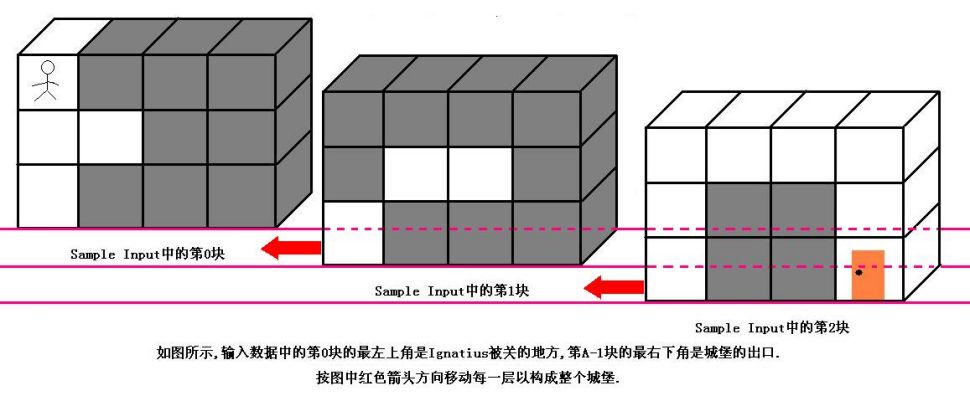
1 3 3 4 20 0 1 1 1 0 0 1 1 0 1 1 1 1 1 1 1 1 0 0 1 0 1 1 1 0 0 0 0 0 1 1 0 0 1 1 0
11#include<cstdio> #include<cstring> #include<cmath> #include<cstdlib> #include<iostream> #include<algorithm> #include<queue> #include<stack> using namespace std; int time_limit,flag,a,b,c; int f[6][3]={{-1,0,0},{1,0,0},{0,-1,0},{0,1,0},{0,0,1},{0,0,-1}}; int map[55][55][55]; struct node { int x,y,z; int t; }; void BFS() { node now,next; flag=0;//初始化 now.x=0; now.y=0; now.z=0; now.t=0; queue <node> q; q.push(now);//入队 map[0][0][0]=1;//标记初始位点 while(!q.empty()) { now=q.front(); //返回队列的第一个入队元素 q.pop(); //删除第一个元素 if(now.x==a-1 && now.y==b-1 && now.z==c-1 && now.t>0&&now.t<=time_limit) { flag=1; //走出迷宫,标记flag break; } else { for(int i=0;i<6;i++) {// 变换方向 next.x=now.x+f[i][0]; next.y=now.y+f[i][1]; next.z=now.z+f[i][2]; next.t=now.t+1; //路径加1 if(next.x>=0&&next.x<a&&next.y>=0&&next.y<b&&next.z>=0&&next.z<c&&!map[next.x][next.y][next.z]) { // 不剪枝的话耗时增加一倍 // if(next.t+a-1-next.x+b-1-next.y+c-1-next.z>time_limit) // { // map[next.x][next.y][next.z]=1; // continue; // } q.push(next); //入队 map[next.x][next.y][next.z]=1;//标记走过的路 } } } } if(!flag) //标记 printf("-1\n"); else printf("%d\n",now.t); //输出 } int main() { int T; while(~scanf("%d",&T)) { while(T--) { scanf("%d %d %d %d",&a,&b,&c,&time_limit); for(int i=0;i<a;i++) //输入数据 { for(int j=0;j<b;j++) { for(int k=0;k<c;k++) { scanf("%d",&map[i][j][k]); } } } BFS(); //开始搜索 } } return 0; }
原文:http://blog.csdn.net/holyang_1013197377/article/details/41653519